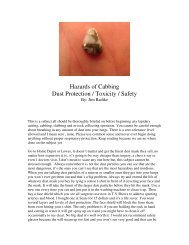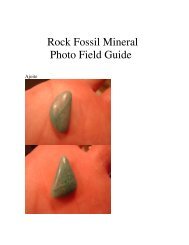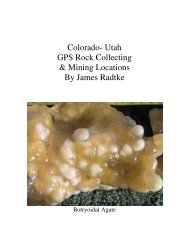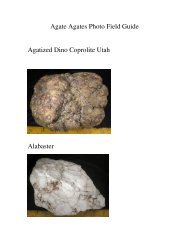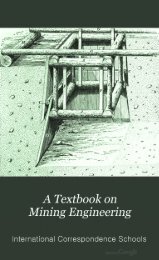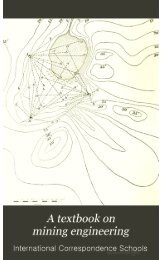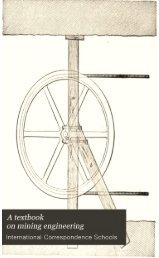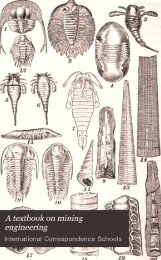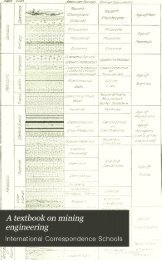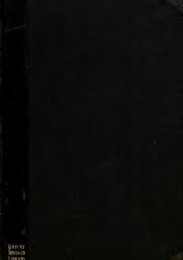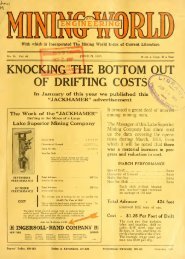- Page 2 and 3:
CORNELL UNIVERSITY LIBRARY THIS BOO
- Page 10:
A NEW EDITIOl^ OF TOLAND'S HISTORY
- Page 13 and 14:
4 PREFACE. Druids, to whom the Gree
- Page 15 and 16:
(> PREFACE. dialect of the Celtic)
- Page 17 and 18:
8 PREFACE. lete tnbde of writing in
- Page 19 and 20:
10 hlPE OF TOLAND. illegitimate, wh
- Page 21 and 22:
. 12 LIFE OF TOLAND.' bis ifa appro
- Page 23 and 24:
!4 LIFE OF TOLAN0. " ject, as witne
- Page 25 and 26:
16 LIFE OF TOLAXD. himself a latitu
- Page 27 and 28:
18 LIFE OF TOLAND. we have but inad
- Page 29 and 30:
20 LIFE OF TOXAND. day of the term,
- Page 31 and 32:
23 I-IPE OP TOLAND. a faggot. The f
- Page 33 and 34:
: ! 24 LIFE OF TOLAND. " Mr. Toland
- Page 35 and 36:
26 l-IFE OF TOLAND. rules of etymol
- Page 37 and 38:
28 LIFE OF TOLAND. don, and present
- Page 39 and 40:
30 LIFE OP TOLAND. On his return to
- Page 41 and 42:
32 LIFE OP TOLAXD. tin, by one Card
- Page 43 and 44:
34 Ll^E OF TOLAND. cietit to tottsm
- Page 45 and 46:
36 LIFE OF TOLANI>. postscript, lin
- Page 47 and 48:
38 LIFE OF TOLAND. most arrogant an
- Page 49 and 50:
40 LIFE OF TOLAND. per prescription
- Page 51 and 52:
42 LIFE OF TOLAND. Mr. Tolanci'fs b
- Page 53 and 54:
44 LIFE OF TOLAKD. ally secured by
- Page 55 and 56:
46 LIFE OP TOLAND. pretended vicege
- Page 57 and 58:
48 LIFE OF TOLAND, resisted them to
- Page 59 and 60:
50 LIFE OF TOLAND. lean instruments
- Page 61 and 62:
52 THE HISTORY tend to the advantag
- Page 63 and 64:
54 THE HISTORY frtmi the dead ; and
- Page 65 and 66:
56 THE HISTORY to the work, whereof
- Page 67 and 68:
58 THE HISTORY them seducing their
- Page 69 and 70:
, - 6*0 THE HISTORY IV. The childre
- Page 71 and 72:
' 62 THE HISTORY This, my lord, I r
- Page 73 and 74:
: , 64 THE HISTORY be as slenderly
- Page 75 and 76:
66 THE HISTORY the nominative case
- Page 77 and 78:
68 THE HISTORY are blinded with bra
- Page 79 and 80:
, the ; 70 THE HISTORY enacted unde
- Page 81 and 82:
72 THE HISTOKY herbs: as also about
- Page 83 and 84:
: 74 THE HISTORV the panegyrics of
- Page 85 and 86:
76 THE HISTORY for banishing them w
- Page 87 and 88:
78 THE HISTORY had the particular i
- Page 89 and 90:
: 80 THE HISTORY much antienter tli
- Page 91 and 92:
: : S2 THE HISTORY temple. Now, the
- Page 93 and 94:
84 THE HISTORY the most authentic w
- Page 95 and 96:
86 THE HISTORY the alphabet of ogum
- Page 97 and 98:
: S8 THE HISTORY fable, tho' ever s
- Page 99 and 100:
90 THE HISTORY " ly what were his r
- Page 101 and 102:
f)2 THE HISTORY the learned allegor
- Page 103 and 104:
94 THE HISTORY indeed have been int
- Page 105 and 106:
96 THE HISTORY alphabet Aihghittir*
- Page 107 and 108:
98 THE HISTORY to be traiiscrib'd i
- Page 109 and 110:
; 160 THE HISTORY deed their human
- Page 111 and 112:
102 THE HISTORY just as in Ireland,
- Page 113 and 114:
104 THE HISTORY ing monument of dru
- Page 115 and 116:
; 106 TH6 HISTORY that ifittni; of
- Page 117 and 118:
108 THE HISTORY, &C. led, and prese
- Page 119 and 120:
110 THE HISTORY On the tops of moun
- Page 121 and 122:
112 THE HISTORY hill of Knock-U'low
- Page 123 and 124:
; 114 THE HISTORY sea, from his ext
- Page 125 and 126:
116 THE HISTORY Those writers, howe
- Page 127 and 128:
118 THE HISTORY gJia, from tlacJid-
- Page 129 and 130:
120 THE HISTORY sent clergy's dues;
- Page 131 and 132:
122 THE HISTORT heal*; which word i
- Page 133 and 134:
124 THE HISTORY his author*. " Who
- Page 135 and 136:
: 126 THE HISTORY and Western lies,
- Page 137 and 138:
128 THE HISTORY from the elder Marc
- Page 139 and 140:
130 THE HISTORY figure at London, m
- Page 141 and 142:
132 THE HISTORV Patric on the brink
- Page 143 and 144:
134 THE HISTOEY iiuments truely the
- Page 145 and 146:
136 THE HISTORY to excede him: but
- Page 147 and 148:
138 THE HISTORY greatest Hand of Or
- Page 149 and 150:
140 THE HISTORY lerCs mount between
- Page 151 and 152:
; 142 THE HISTORY with a small vari
- Page 153 and 154:
114 THE HISTORY neafih Taran or Tar
- Page 155 and 156:
146 THE HISTORY nor are they call'd
- Page 157 and 158:
148 *l'HE HISTORY particular, for h
- Page 159 and 160:
: : : : 150 THE HISTORY pillars, fe
- Page 161 and 162:
: 152 THE HISTORY the First of Engl
- Page 163 and 164:
; 154 THE HISTORY destructive, bein
- Page 165 and 166:
' 156 THE HISTORY firmed by Pliny,
- Page 167 and 168:
158 THE HISTORY green sod on the ou
- Page 169 and 170:
: 160 THE HISTORY XIX. I shall conc
- Page 171 and 172:
162 THE HISTORY tion and manners. E
- Page 173 and 174:
164 THE HISTORY to accomplish this
- Page 176 and 177:
THE THIRD LETTER, TO THE RIGHT HONO
- Page 178 and 179:
OF THE DRUIDS. 169 him to be Charon
- Page 180 and 181:
OF THE DRUIDS. 171 Now that Hercule
- Page 182 and 183:
. t OF THE DRUIDS. 173 mis'd, now f
- Page 184 and 185:
OF THE DRUIDS. 175 hid in the shoos
- Page 186 and 187:
OF THE DRUIDS. 177 of the antient w
- Page 188 and 189:
OP THE DRUIDS. 179 brated modern wr
- Page 190 and 191:
j OF THE DRUIDS. 181 or rather, as
- Page 192 and 193:
OF THE DEUIDS. 183 trymen had their
- Page 194 and 195:
OF THE DRUIDS. 185 polite Romans? w
- Page 196 and 197:
OF THE DRUIDS. 187 which Hands may
- Page 198 and 199:
; ; OF THE DRUIDS. 18i> What course
- Page 200 and 201:
OF THE DRUIDS. ISl in any man, as i
- Page 202 and 203:
OF THE DRUIDS. lf)3 tish climate, o
- Page 204 and 205:
; OF THE DRUIDS. 195 same book, as
- Page 206 and 207:
: OF THE DRUIDS. 197 wards invented
- Page 208 and 209:
them all; eP THE DRUIDS. l99 for th
- Page 210 and 211:
OF THE DRUIDS. 201 possibly want an
- Page 212 and 213:
OF THE DRUIDS. 203. and Norway) thi
- Page 214 and 215:
" reads OV THE DRUIDS. 205 "were al
- Page 216 and 217:
; OF THE DRUIDS. 207 SO call'il, sa
- Page 218 and 219:
OF THE DRUIDS. 209 tijnents; concea
- Page 220 and 221:
: OF THE DRUIDS. 211 your situation
- Page 222 and 223:
O* THE DRUIDS. 213 litlges of mount
- Page 224 and 225:
or THE DRUIDS. 215 Perpctnal spring
- Page 226 and 227:
OF THE BRUIDS. 217 wheat, and conse
- Page 228 and 229:
OP THE DRUIDS. 219 observ'd to brin
- Page 230 and 231:
: OF THE DRUIDS. 221 •which is th
- Page 232 and 233:
OP THE DRUIDS. 223i who live accord
- Page 234 and 235:
for labor. OF THE DRUIDS. 225 Bui I
- Page 236 and 237:
OF THE DRUIDS. 227 what has been in
- Page 238 and 239:
MR. TATE'S QUESTIONS ABOUT THE DRUI
- Page 240 and 241:
OF THE DRUIDS. 231 IX. Whether the
- Page 242 and 243:
OF THE DRUIDS. 23S man that did not
- Page 244 and 245:
OF THE DRUIDS. 235 penkerddiaidd, a
- Page 246 and 247:
; OF THE DRUIDS, 237 and propagator
- Page 248 and 249:
OF THE DRUIDS. 239 and called unto
- Page 250 and 251: OF THE DRUIDS, 241 all transgressor
- Page 252 and 253: OF THE DRUIDS. 243 or foot to the N
- Page 254 and 255: an officer ; OF THE DRUIDS. 24-5 an
- Page 256 and 257: OF ^HE DRUim. 247 casij,0» of (COU
- Page 258: OF THE DRUIDS. 249 Bai'dociicuUus,
- Page 262 and 263: — NOTES. Note I. Page 54. y3 MONG
- Page 264 and 265: I Note NOTES. 255 they are exempted
- Page 266 and 267: — NOTES. 257 tlonibus coeuni, cee
- Page 268 and 269: NOTES. 259 times iatermixed with th
- Page 270 and 271: NOTES. 201 writers. It is called th
- Page 272 and 273: : — —• NOTES. 263 that there
- Page 274 and 275: gtone petitur : NOTES 265 et ante o
- Page 276 and 277: NOTES. 267 and by the English OUaw
- Page 278 and 279: NOTES. 269 It is rather remarkable
- Page 280 and 281: — NOTES. 271 jecture to guide the
- Page 282 and 283: NOTES. 273 name for the purpose, wh
- Page 284 and 285: KOTES. 275 -et pola Deripere lunam
- Page 286 and 287: y NOTES. 277 guages !s point blank
- Page 288 and 289: — — pass betwixt the flreSj NOT
- Page 290 and 291: — NOTES. 281 Greek Boidromios, st
- Page 292 and 293: NOTES. 283 witchcraft, Fairies, &c.
- Page 294 and 295: ejected. NOTES. 285 I have, in a fo
- Page 296 and 297: NOTES. 287 were bwfo-Wed dfeHles; f
- Page 298 and 299: NOTES. 289 sufficient for my purpos
- Page 302 and 303: NOTES. 293 Morib. Genn, cap. 1 5. g
- Page 304 and 305: — NOTES. 295 of the Up'bri, f'tik
- Page 306 and 307: NOTES. 297 following words:— " Se
- Page 308 and 309: NOTES. 299 in etery family of the k
- Page 310 and 311: — — bishop, with their attendan
- Page 312 and 313: KOTES. 30S n
- Page 314 and 315: NOTES. 305 cial, as well as a relig
- Page 316 and 317: — — NOTES. 307 iniag«S (lUeral
- Page 318 and 319: NOTES. 309 no notice of the groves
- Page 320 and 321: NOTES. 311 made use of by the Druid
- Page 322 and 323: NOTES. 313 ceptioD, mtitUated and i
- Page 324 and 325: — NOTES. 315 all. To such a peopl
- Page 326 and 327: NOTES. 317 any Gothic judicial circ
- Page 328 and 329: NOTES. 319 of the Cromlech is ita i
- Page 330 and 331: KOTES. 321 is paid for the life of
- Page 332 and 333: NOTES. 323 Note LIV.—Page 149. Th
- Page 334 and 335: : NOTES. 52S Note LVII.—Page 152.
- Page 336 and 337: NOTES. 327 to the Celtic districts.
- Page 338 and 339: ' But, NOTES. 329 Cfltic or Highlan
- Page 340 and 341: NOTES. 331 kind. There is a/ac simi
- Page 342 and 343: — tion whatever. NOTES. 333 Both
- Page 344 and 345: — NOTES. 335 red hair and largo l
- Page 346 and 347: NOTES. 337 feigned people, people o
- Page 348 and 349: — NOTES. 339 Mr. Pinkarton, that
- Page 350 and 351:
; NOTES. 34X Note LXVI.—Page 183,
- Page 352 and 353:
NOTES. 343 ge»cy, when no omen cou
- Page 354 and 355:
would have remained. NOTES. 345 But
- Page 356 and 357:
nor -winged. NOTES. 347 Tteroeis la
- Page 358 and 359:
NOTES. .349 cial circle, the suprem
- Page 360 and 361:
NOTES. 351 •—Of all attempts to
- Page 362 and 363:
NOTES. 853 pended on respecting the
- Page 364 and 365:
NOTES. 355 the sound of I stands Cl
- Page 366 and 367:
— NOTES. 357 not deter the lonian
- Page 368 and 369:
NOTES. 359. Note LXXXIV. Hogmius,
- Page 370 and 371:
NOTES. 361 Note LXXXVfl. Vergobretu
- Page 372 and 373:
— silver and Jlva; Melosa and Mel
- Page 374 and 375:
Can ^ MoTfis. 365 as they were, inc
- Page 376 and 377:
NOTES. 36i7 the nations situated wi
- Page 378 and 379:
' NOTES. 369 he gives us a long quo
- Page 380 and 381:
NOTES. 371 ting, lest the VHlgar sh
- Page 382 and 383:
ting, and had an alphabet of their
- Page 384 and 385:
NOTji;s. 375 curator of Gaul, and h
- Page 386 and 387:
Pinkarton NOTES. 377* JEorUm seicra
- Page 388 and 389:
NOTES. 379 fish language, sermo hau
- Page 390 and 391:
NOTES. 381 oars were disposed in no
- Page 392 and 393:
NOTES. 383 ously maintained, antl a
- Page 394 and 395:
Celtic.
- Page 396 and 397:
' NOTES. 387 riginal language of As
- Page 398 and 399:
NOTES. 889 tiidt they, (the Irish)
- Page 400 and 401:
NOTES. ,19J Sfient of the alphabet
- Page 402 and 403:
NOTES,. 393 tliiog would happen wer
- Page 404 and 405:
NOTES. 395 the assertions of Greece
- Page 406 and 407:
NOTES. 397 Antiquity of the Irish M
- Page 408 and 409:
. Ireland NOTES. 399 turn aspifed t
- Page 410 and 411:
NOTES. 401 liruids were planted in
- Page 412 and 413:
NOTES. 403 Roman power reached them
- Page 414 and 415:
I •shire. •NOTES. 405 From llie
- Page 416 and 417:
NOTES. 407 tiuiformljr asserts that
- Page 418 and 419:
— NOTES. 40& sacrifices, because
- Page 420 and 421:
NOTES. 411 him, Sesbstris and Tanat
- Page 422 and 423:
NOTES. 413 ^ Pompeius might be of s
- Page 424 and 425:
KOTES. 415 such a striV'Dg peculiar
- Page 426 and 427:
NOTES. 417 therefore have intervene
- Page 428 and 429:
NOTES. 419 time coming a triennial
- Page 430 and 431:
: • Maduerunt The — ; NOTES. 42
- Page 432 and 433:
On — NOTES. 423 longitwdinem, on
- Page 434 and 435:
- The — NqTES. 425 ers. The man w
- Page 436 and 437:
, acceded Notes, 427 ah ulteriori S
- Page 438 and 439:
NOTES. 429 Alhdnach- and ev^il ia G
- Page 440 and 441:
« — NQTES. 431 Picis, were oMige
- Page 442 and 443:
' ' NOTES. 433 can derive Goth from




